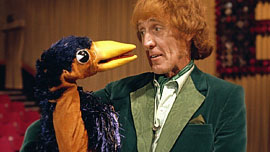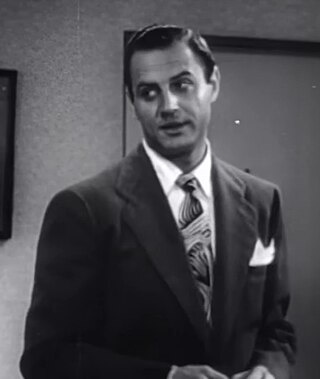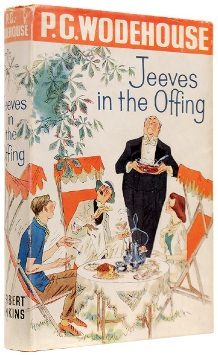
The bunyip is a creature from the aboriginal mythology of southeastern Australia, said to lurk in swamps, billabongs, creeks, riverbeds, and waterholes.

Dexter's Laboratory is an American animated television series created by Genndy Tartakovsky for Cartoon Network as the first Cartoon Cartoon. The series follows Dexter, an enthusiastic boy-genius with a hidden science laboratory in his room full of inventions, which he keeps secret from his clueless parents, who are only referred to as "Mom" and "Dad". Dexter is at constant odds with his older and more extroverted sister Dee Dee, who always gains access to the lab and inadvertently foils his experiments. Dexter has a bitter rivalry with his neighbor and classmate Mandark, a nefarious boy-genius who attempts to undermine Dexter at every opportunity. Prominently featured in the first and second seasons are other segments focusing on superhero-based characters Monkey, Dexter's pet lab-monkey/superhero, and the Justice Friends, a trio of superheroes who share an apartment.

Greg the Bunny is an American television sitcom that originally aired on Fox in 2002. It starred Seth Green and a hand puppet named Greg the Bunny, originally invented by the team of Sean S. Baker, Spencer Chinoy and Dan Milano. Milano and Chinoy wrote and co-produced the Fox show. The show was spun off from The Greg the Bunny Show, a series of short segments that aired on the Independent Film Channel, which were based on the Public-access television cable TV show Junktape. A show spin-off, called Warren the Ape, premiered on June 14, 2010, on MTV.

Rodney Stephen Hull was a British comedian and popular entertainer on television in the 1970s and 1980s. He rarely appeared without Emu, a mute and highly aggressive arm-length puppet modelled on the Australian bird.

Howdy Doody is an American children's television program that was created and produced by Victor F. Campbell and E. Roger Muir. It was broadcast on the NBC television network in the United States from December 27, 1947, until September 24, 1960. It was a pioneer of children's programming and set the pattern for many similar shows. One of the first television series produced at NBC in Rockefeller Center, in Studio 3A, it pioneered color production in 1956 and NBC used the show to promote color television sets in the late 1950s.

Mr. Squiggle is an Australian children's television series, and the name of the title character from that ABC show. The show was presented on television in many formats, between its inception on 1 July 1959 and 1999, from five-minute slots to a one-and-a-half-hour variety show featuring other performers, and has had several name changes, originally airing as Mr. Squiggle and Friends. At its height, the program was one of the most popular children's programs in Australia and toured theatre and conventions, entertaining several generations who grew with the program. It became one of the longest-running children's programs on Australian television, despite originally only asked to fill a six week gap on the ABC's schedule.

By Jeeves, originally Jeeves, is a musical with music by Andrew Lloyd Webber, and lyrics and book by Alan Ayckbourn. It is based on the series of novels and short stories by P. G. Wodehouse that centre around the character of Bertie Wooster and his loyal valet, Jeeves.

Lionel Charles Jeffries was an English actor, director, and screenwriter. He appeared primarily in films and received a Golden Globe Award nomination during his acting career.

Brad Dexter was an American actor and film producer. He is known for tough-guy and western roles, including the 1960 film The Magnificent Seven (1960), and producing several films for Sidney J. Furie such as Lady Sings the Blues. He is also known for a short marriage to Peggy Lee, a friendship with Marilyn Monroe and for saving Frank Sinatra from drowning. Dexter's tough-guy roles contrasted with his easygoing and friendly real-life personality.

Jeeves in the Offing is a comic novel by P. G. Wodehouse, first published in the United States on 4 April 1960 by Simon & Schuster, Inc., New York, under the title How Right You Are, Jeeves, and in the United Kingdom on 12 August 1960 by Herbert Jenkins, London.

Cousin Skeeter is an American children's sitcom, that originally aired on Nickelodeon from 1998 to 2001. It starred Robert Ri'chard as Bobby, a young boy whose life is changed when his strange cousin, Skeeter, comes to stay with his family. With Skeeter's help, Bobby learns life lessons and tackles the ups and downs of growing up. The show also included Meagan Good as Bobby's friend Nina, Rondell Sheridan as Bobby's father Andre, and Angela Means as Bobby's mother Vanessa. Skeeter is portrayed by a hand puppet with Bill Bellamy providing his voice, and Drew Massey performing the puppetry, assisted by Alice Dinnean. Within the show, Skeeter is treated like a regular human and no mention of him being a puppet is made. Although the series was shot in a single-camera format, the show used a laugh track.

The Magic Pudding: Being The Adventures of Bunyip Bluegum and his friends Bill Barnacle and Sam Sawnoff is a 1918 Australian children's book written and illustrated by Norman Lindsay. It is a comic fantasy, and a classic of Australian children's literature.

Charles John Thomas McCann was an American actor, comedian, puppeteer, commercial presenter and television host. He was best known for his work in presenting children's television programming and animation, as well as his own program The Chuck McCann Show and he also recorded comedy parody style albums.

Seth Benjamin Green is an American actor and filmmaker. His film debut came with a role in the comedy-drama film The Hotel New Hampshire (1984), and he went on to have supporting roles in comedy films throughout the 1980s, including Radio Days (1987) and Big Business (1988).
William Cohen was an American actor born in Philadelphia, to an opera actor and singer. As Bill Britten, he is best known for his portrayal of Bozo the Clown in the New York City market.
The title Sir Guy is most commonly ascribed to Sir Guy of Gisbourne, a fictional character in Robin Hood folklore.
Come On, Jeeves is a comedic play co-written by Guy Bolton and P. G. Wodehouse. The play was written in the summer of 1952, and toured the English provinces in the summer of 1954. Wodehouse adapted the play into the novel Ring for Jeeves, which was first published in April 1953, a year before the play reached production. Come On, Jeeves is still occasionally produced and was presented as recently as December 2017.














